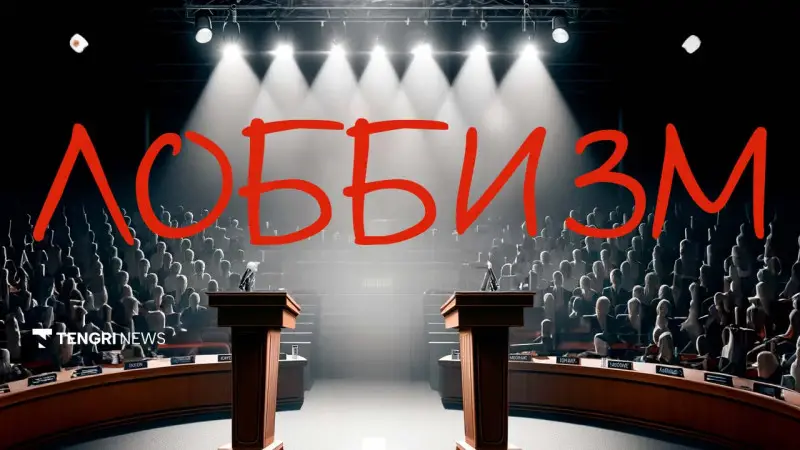"When developing laws and various rules, financial and industrial groups and large businesses have a great influence on decision-making. This is typical for almost all countries, including developed ones. But when this happens behind the scenes, in conditions of complete legal instability, a wide field for corruption is created. In the civilized world, politics is not formed behind closed doors," Kassym-Jomart Tokayev said last spring, speaking to deputies.
A year later, there is no movement on this issue, at least in the public field. Meanwhile, talks about the need to legalize gray players in the political field in the republic have been going on for many years. Tengrinews.kz I learned from experts whether we need a law on lobbying, how to regulate this field and what it will give ordinary Kazakhstanis.
The concept of lobbying comes from the English lobby – "lobby" and implies activities to influence local and central authorities (legislative and executive), international organizations and other structures in order to achieve the adoption/non-acceptance of certain decisions.
In some countries, lobbying is legalized, in others it is equated to corruption and is prohibited. The United States was the first country to consolidate the regulation of lobbying at the federal law level in 1946. Private lobbyists and organizations are required to officially register and report on contracts with each client, disclosing data on fees. Officials and companies are obliged to do the same, violation entails fines and even imprisonment.
In 2020, lobbying activities were regulated in 23 countries out of 41 OECD member and partner countries. Lobbying is regulated in different ways in the European Union. In Austria, Germany and a number of other countries, disclosure of interaction with lobbyists is mandatory for representatives of all branches of government. Officials of 16 countries, including Scandinavian ones, are not required to disclose such information.
Other States have adopted self-regulation (Sweden). Luxembourg and Malta do not regulate this activity. In neighboring Russia, the lobby is also not regulated, although the issue has been raised repeatedly. According to international organizations, two thirds of senators there promote the interests of certain groups.
The National Chamber as an example
Economist Askar Kysykov believes that lobbying in Kazakhstan is already regulated to one degree or another.
"This can be seen in the example of the National Chamber of Entrepreneurs "Atameken" (NCE), which is the legitimate lobby of all business in the country. There are also industry associations. But the efficiency of the chamber is at a low level. And the work of channels of interaction between industry business and government agencies, deputies through expert councils and working groups is unorganized. It is necessary to revive the model of interaction between business and the state so that the NCE has a real negotiating power in dialogue with the government and Parliament, consolidate the industry business with an emphasis, including on small and microbusiness," the economist believes.
He considers it possible to adopt a framework law through which lobbyist organizations will have access to lawmaking on transparent terms and normal principles. They will have de jure rights and obligations.
The issue of introducing lobbying into the legal field in our country according to the Western model is hardly possible due to the difference in context, Kysykov believes.
"In the USA, if a company wants to lobby for its interests, it must create a special lobbying unit, register in the appropriate register or conclude an official contract with professional lobbying structures, bring all information to the public field, including the size of the budget for the promotion of the initiative. This is not related to direct bribery of deputies: lobbyists contact congressmen and can implement a charity program in the staff of the people's deputy, and in return he promotes the initiative," the source explains.
De jure, de facto and third party
Head of the DESHT Analytical Center Kuanysh Zhaikov states: the discussion of the law on lobbying has been going on in Kazakhstan for 25 years.
"There are three sides to this issue: formal, informal and law enforcement. Only the appearance of the law will not solve the problem. By law, the use of hookah in public places is prohibited in the Republic of Kazakhstan, but hookah bars work. We have a lot of broken laws, so why should the lobby document work?"
"The law itself does not mean anything - in fact, it is a formal rule. It may well turn out to be a framework: we give definitions and designate the players. But this will not take lobbying out of the gray area. And this is the first problem," says the economist.
The second problem, in his opinion, is the conflict between formal and informal rules.
"In this context, it is much more important to study lobbying in terms of how it works de facto. This is usually done by public policy guys who explore the political arena – a place where different interest groups collide and different decisions are made. Experts study in which areas which interest groups are available, who has what "approach" and how they are connected. Accordingly, a map is drawn in which the mechanism of the lobby becomes clear. After that, you have a choice: you will either break this case, or legalize it – write a law for informal practice," says Zhaikov.
The third problem is law enforcement.
"After the appearance of the law, how will we monitor its implementation? Will we oblige organizations to register, will we come up with an OKED "lobbying activity"? How do we get companies to actually subscribe to this OKED and show all transactions?.. Are we able to separate the lobby from any other activity?"
"We have such a complex execution apparatus that if you untie his hands, he implements a arbitrarily developed system of punishments, freely interpreting the norms of the law. In this case, anyone can be brought under the lobby," the analyst predicts.
He marks a fine line when ideas move into the lobby.
"In the United States, the Republican Party stands for a market economy with minimal taxes and a conservative lifestyle. Democrats are "drowning" for the expansion of social programs and freedom of privacy, LGBT rights, and so on. Both are backed by specific think tanks that lobby for the interests of parties through the development of appropriate drafts of state policy. Kazakhstani think tanks (analytical centers) like to organize round tables on topical issues: tobacco or vapes, for example. They assemble a group of experts, discuss it for two hours. Or MFOs declare that microfinance is normal, contrary to the trend about creditworthiness. Can these steps be signed under the lobby? And if the listed participants did not take money to promote the idea, but really believe in it?" - the head of the analytical center asks questions.
He admits that he personally believes in a market economy and, with the regular raising of the issue of excessive state regulation, he is suspected of lobbying.
"Yes, I can be brought under the lobbyist, because in the end, some private company will become the ultimate beneficiary of promoting my ideas. But did she pay me? No."
"Sometimes I have to stop writing on some topics, because they start hinting at the lobby. Sometimes they come out directly and offer to work within a certain issue, promising budgets and information for research. I refuse: to be blown up by such a mine means to bury your reputation," Zhaikov is sure.
Grassroots and upper levels
The economist calls for a separation of grassroots and top lobbying.
"There are no common public interests - there are many different groups. If a construction company wants to build a residential complex in the Botanical Garden, it infringes on the interests of the residents of the area. Lobbyists are needed to defend the interests of the unorganized majority against the organized minority. And this is a separate profession, for which you have to pay so that people do it on a regular basis.
The state can stimulate the emergence of public lobbyists through grants. This is necessary because in grassroots lobbying, the most important thing is to level the field: if the negotiation process is skewed, it is necessary to support the weak," says Zhaikov.
Top lobbying is about the point of divergence between developed and developing countries, about issues of high corruption, a system of checks and balances, the control of the authorities, and the non–admission of arbitrariness on their part.
"Even if we change the entire Constitution with one sentence that it is impossible to lobby, nothing will change. This is a matter of great historical institutional changes. We still have to go through this process in order to institutionalize the lobby at the highest level and make it more civil," CEO DESHT emphasizes.
There is no uniform practice in the world for working with lobbies, the interlocutor continues.
"There is an Anglo-Saxon model, a continental model, models of developing countries... If we really want to legalize the lobby, then we need to build our own law, and it will not be like the best practice of the USA and the EU," the economist is sure.
Beneficiaries of the process
According to Kuanysh Zhaikov, if there was a demand for lobby regulation, the law would have appeared a long time ago.
"As it is, the law on lobbyists has no lobbyists. But the problem is not in the absence of a document, but in high corruption. Who is the ultimate beneficiary of the regulation of the lobby process? Not the public, ordinary people have enough problems of their own to also understand this chain of connections. The beneficiaries are the players of the political field and the media. It is important for journalists to know who to work with and who not, to evaluate an expert correctly, to be sure whether his opinion is paid or independent, whether this or that topic is deliberately heated, or whether there is an objective demand for it from the public," the interlocutor says.
The second beneficiaries are representatives of government agencies who receive massive amounts of information, and often they themselves do not fully understand the topic.
"All these points relate to transaction costs that complicate the work. It takes time to immerse yourself not in the topic, but in processes and personalities. Is it possible to make this work easier? Yes, through the publication of information in the public domain, who, how and with what is connected. It is necessary to bring into the public field all state reports, research, on the basis of which state programs, national projects, concepts, resolutions are then developed," Kuanysh Zhaikov is sure.
In fact, lobbying organizations in the country hide behind the signs of law and consulting firms, GR companies (government relations - relations with the government).
"Public disclosure of information about which purchases and research these companies are involved in, the time of the event, the indication of the state agency-the customer, the head, the curator, the budget, all subcontractors would help to understand the communication schemes and make a decision whether to work with them or not. Such a reputation audit. And no separate law on lobbying is needed: such mechanisms radically reduce transaction costs," the head of DESHT emphasizes.
One has a spear, the other has a kalash
Kuanysh Zhaikov indicates another name for lobbying – advocacy.
"And this is about protection: private companies need to protect themselves. And if lobbying structures need to be funded for this, they will do it. In a competitive market, business operates on an equal footing."
"It's like two batyrs in the steppe with the same weapon. Whoever has a cooler product is on the horse. Consumers will benefit from the battle of the players: the quality is better, the product is cheaper. Problems start when one player breaks the rules of the game: He goes to the state and begins to convince it to rewrite them. In addition to the spear, he is given the right to use a Kalashnikov assault rifle. And the second player only has a spear."
"In the context of lobbying, this is done delicately, because market participants know the strengths and weaknesses of the opponent. Due to legislative regulation, the competitor's strong position will disappear," the economist says, adding that the second party, intending to survive, will do the same.
The economist compares lobbyists to Charon: if he was an intermediary between the world of the living and the dead, then the lobbyist is a liaison between business and politicians.
"A lobbyist can escort you to high offices, tell you who to put pressure on and how much to pay, and not always the payment is monetary. This can be a barter in the form of a business trip, training at a conditional Stanford, and so on. By the way, this is one of the problems of direct lobbying: first you regulate the sphere, and then you start working in it. And there are a lot of such cases in Kazakhstan, when a minister, vice minister, head of some committee is responsible for the sphere, and then leaves the civil service and ends up in a private corporation or, conversely, a representative of the private sector becomes a regulator of the sphere," the interlocutor notes.
It is necessary to stop such corrupt lobbying by banning: if you regulate the sphere, then for the next 5 years you do not have the right to hold positions in it, even at the level of adviser to the chairman.
"However, this hits a different topic: everyone wants pros in positions, and they come from business… In any case, a separate lobbying law is not required to regulate these issues. And this is a working measure. We have a lot of officials, especially in the banking sector, who took advantage of gaps in the current legislation and easily built careers," the economist says.
Lobbies in the mining and oil sectors are a separate topic of conversation, Zhaikov continues.
"The interests of the elites have historically advanced in these areas. Foreign companies that want to come to us on open terms are starting to face this status quo. And they have questions about where to find people who know how decision-making works in this industry. And law firms and GR companies are getting in touch. Others appear against some lobbyists, and due to this confrontation, it is possible to more or less coordinate the industries and maintain a balance. This is the system of checks and balances," says the economist.
In general, if we manage to make decision-making processes transparent and competitive, then the price of the issue is a tripling of Kazakhstan's GDP, the economist believes.
In the interests of the "new Kazakhs"
, the President of the Association for Business, Society and State Relations, Ayazhan Uteuova, also does not consider the legalization of lobbying to be a solution to the issue.
"It is more a question of the effectiveness of the existing institutions of power, and in the context of the fine line between lobbying and corruption – to anti-corruption. I agree with experts who argue that it is more expedient to regulate lobbying indirectly in Kazakhstan. That is, to achieve transparency in the activities of government agencies, equal access to information, institutionalization of discussion of important issues with the public with appropriate independent expertise of subsequent decisions. And we often even have government agencies that lack information and knowledge on some issues, which are then submitted to bills," says the political consultant.
She recalls that a number of experts do not see the need for a separate law on lobbying against the background of the law on Self-Regulation in force since 2015.
"The law on self-regulation allows industry organizations to respond more flexibly to changes in their field of activity and resolve issues without direct government intervention. But self-regulation and lobbying represent different mechanisms for regulating activities in different fields, their functions do not quite coincide," says Uteuova.
She emphasizes the need to distinguish between the concepts of lobbying and corruption.
"We are doing analytics in the field of public procurement of one ministry – there is an unplowed field. We have to find out who insisted on buying the Zaporozhets instead of the Mercedes, which eventually led to a tragic outcome. But this is about corruption. In this context, it is more important to introduce a law on personal liability without a statute of limitations. Information should be publicly available about who was responsible for a specific state program, the decision - which minister, akim," the interlocutor believes.
The political strategist tells how in 1998 an expert survey was conducted on the topic "In whose interests reforms are being carried out in Kazakhstan." 43 percent of respondents answered that it is in the interests of the departmental and bureaucratic nomenclature. 29 percent considered it in the interests of clan groups, 24 percent - in the interests of the emerging middle class, 22 percent - in the interests of financial and industrial circles. 16 percent believed that it was in the interests of the "new Kazakhs" (the term was not disclosed). In the interests of farmers, there are zero respondents. For the sake of improving the lives of criminal mafia structures, 8 percent of respondents answered this way, for the sake of the population - 9 percent.
"If the law on lobbying is adopted, then with a clear statement of all requirements for participants in the process, up to a ban on occupying certain vacancies in case of a conflict of interest (as in Germany), the amount of fees for supporting lobbying interests, tax reports. There should be strict control over the work of lobbying companies, the list of which should be publicly available. All this will increase the possibility of official interaction with government agencies, which currently has problems. In general, I am in favor of the law on lobbying, but subject to the work of all government systems: law enforcement, judicial and so on," says the political consultant.
Put in a word about the developers
Earlier, deputies in the ODAGAI project answered a question about lobbying various interests in their work.
The former Mazhiliswomen Dinara Shukizhanova has already said that she sees nothing wrong with promoting the interests of agricultural producers.
"When I defend the rights of industrial production enterprises on committees, this is also a kind of lobby for the manufacturing industry. And that's okay.: you came from the sphere, imagine, "drown", do not hide the problems," Shukizhanova noted.
Bakytzhan Bazarbek stated: in 2018, the interests of developers were lobbied by the hands of deputies of the then convocation.
"After my introduction of unpopular bills with amendments on issues of seismic safety, the prohibition of the provision of sites in hazardous areas of Almaty, they come to me and say: "You're hurting business." As a single-mandate member, no one can say to me: "Do not touch this norm, do not introduce this amendment, vote for this bill." But I was faced with a hidden provocation: a baby carriage was burned to me," Bazarbek shared.
Deputy Konstantin Avershin, in turn, suggested defining definitions.
"Our lobbying has a negative connotation. And lobbyists in Kazakhstan are, as a rule, entrepreneurs, financial and industrial groups. I am categorically opposed to such manifestations," Avershin said, adding that there is useful lobbying, for example, by environmental communities, which is worth listening to.
And during his work in the maslikhat of Almaty, lobbyists-developers approached him.
"At that time we were considering the problems of point development. This is a matter of principles, ethics, and a single representative of the branch of government," the deputy noted.
Rules of the game: dinner with a deputy is canceled
Partner of the international consulting company SIC group USA LLC, President of the Ukrainian Association of GR Professionals and Lobbyists (UAGRPL) Katerina Odarchenko talks about the big difference between lobbies in developed and developing countries.
"Our countries (Katerina is from Ukraine – author's note) so far, monopolies are sinning, and this is about a direct connection between the economic situation and the political situation... Under Yanukovych, the oligarchs in Ukraine had a direct influence on the parliament. Deputies worked directly for financial and industrial groups, received a second salary and did exactly what they were told. That is, they did not fulfill the function of representing the people."
"In the USA, financial and industrial groups have a legal way to contribute money to the election fund of a candidate for deputy. Or businessmen can allocate money to the political action committee (PAC) – organizations that finance politicians and parties. There are conservative, liberal races, for Israel and others. On the website opensecrets.org - Information generator for all election donations and lobbying agreements - you can find out who contributed the most funds to specific races. Such transparency is the result of high competition in politics," says the political strategist.
In addition, there are elements of regulatory policy that dictate the rules of the game.
"In the United States, you can't treat a deputy to dinner - it's tantamount to corruption. At the same time, being a politician, you can openly contact the relevant associations, saying that you are in favor of additional subsidies to the industry, and take the money, which will need to be informed on a special website where all lobbying contracts are posted. And failure to comply with the reporting requirement can be punished. Many well-known consultants were punished for not notifying about lobbying activities," the expert notes.
The lobbyist Association, in which the interviewee is a member, participated in the development of laws in a number of countries.
"Is it necessary to introduce strict regulation of lobbying in Kazakhstan, as in the United States? No, it won't work. In markets where the issue has not been resolved, it is necessary to introduce soft measures, explain tools to people, including medium-sized businesses, who will see the advantages of a legalized lobby, which is better than corruption," the political strategist believes.
Like any other consulting and services market, lobbying has its own prices: on average, a lobbyist charges from 15 to 45 thousand dollars per month for work, says Odarchenko.
"It depends on the volume and complexity of the work. Such contracts often include not only salary costs, but also promotion points – this is part of GR: preparing a map of stakeholders – decision makers, writing legal documents, analyzing their impact, and media campaigns. These directions may require another 300 thousand dollars or a million. Of course, like any business activity, lobbying services are taxed," the interviewee continues.
When are animal breeders more effective than oligarchs
The legalization of lobbying with the right model gives a better law-making process, the political consultant emphasizes.
"Will the law on the protection of the rights of patients with cancer be better developed if patients participate in it? Of course, because they know the problems from the inside. This is an example of advocacy, representing certain public interests. As well as legislation for farmers, it will be much better if farmers take part in its development. And the key task of the law on lobbying will be to make the procedure transparent and competitive, since livestock breeders can compete for subsidies with fish producers or with farmers who grow crops. The lobby is mainly about the struggle for subsidies, whether it is the European Parliament or the Mazhilis. In this competition, a new quality of the legislative process is being born," Odarchenko emphasizes.
"We started our association of lobbyists in Ukraine from scratch. At one time, this was something incomprehensible for Ukrainian businesses, they did not know what GR was. But when we started this communication, business saw that the legalized lobby is cheaper than corruption, more transparent and has a longer-term effect," Odarchenko sums up.
Illustrations and collages: Тengrinews.kz/Акмарал Karashon
Author: Назгуль Абжекенова
Source: https://tengrinews.kz/article/eto-deshevle-korruptsii-kak-uzakonit-lobbizm-v-kazahstane-2364/



